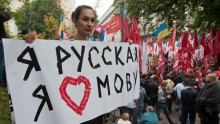Recently, a number of the Czech Republic MPs from the Communist Party of Bohemia and Moravia have blocked the ratification of the EU-Ukraine Association Agreement and postponed any consideration on its matter for at least a month. This act once again confirmed how deformed the Czech public opinion on the situation in Ukraine is. One of the communists’ arguments was that the separatist rebellion in Donbas had emerged out of fear that the use of Russian language would be forbidden. Kremlin propaganda in the Czech Republic spreads not only through the communists’ efforts – President Milos Zeman also helps them.
At the same time, the Czechs have their own tragic experience with the demagogic use of words such as “people,” “the right for self-determination,” “the right to the mother tongue” and so on. At the end of the 1930s these slogans were used by Nazi leader Adolf Hitler, who used false propaganda to instill chauvinism, racism, and xenophobia and claim his power over the German people, which allowed him to drive many people into the slaughter of the World War II.
When the phrase “one who speaks Russian is the Russian – and Russia is where the Russians live” was uttered by Kremlin, one couldn’t help but have the feeling that the Nazi Fuehrer rose from the dead. Resurgence of imperialist and “Great-Russian” sentiment among the population of the Russian Federation and the growth of Vladimir Putin personality cult confirms that the Russians are susceptible to propaganda to the same extent as the Germans 80 years ago were. And the war is already raging.
Ukrainians are forced to defend the territorial integrity of their state in arms, and must confront the false propaganda of hybrid war not only domestically, but also on the international scale. Many years ago, Ukrainian Parliament had already approved the language law, which complies with EU norms and respects the right of national minorities to use their mother tongue.
The reality shows that it is necessary above all to preserve the Ukrainian language and control effectively the content of the Ukrainian language law.
One can learn by the example of the Slovak Republic: since 2009 there is a law to protect the state language, which establishes penalties for violations ranging from 100 euros up to 5,000 euros for individuals and legal entities. The appendix to this law includes the list of Slovak villages, towns, and cities, where the number of minority residents (e.g. Hungarians) exceeds 20 percent – in which case, the law permits the use of minority languages when communicating with the state authorities, as well as in the advertising, signboards, etc. At the same time, the law obliges public officials in these areas and regions to speak the state language. Any violations are subject to fines.
Ukrainian language law is even more relaxed in regard to the number of minority residents, and sets only 10 percent limit to allow official communication in other languages. But do government officials command the state language well enough and do they have to use it in communication with the citizens of Ukraine when addressed in Ukrainian? Are civil servants in hiring required to prove that s/he knows Ukrainian? Do civil servants have the opportunity to learn Ukrainian at specialized courses?
As it is true for other areas of human activity, the language issue and the national policy will not have its problems solved unless there are complete order and control. And especially now, when Ukrainians shed blood in the war, it is unacceptable to have the enemy use demagogy to turn the disorder in the government, the corruption of senior officials and the imperfection of laws into separatism and ethnic hatred.
The experience of Central European countries confirms clearly that success and prosperity are where the law and order are. And vice versa, when ruled by lawlessness and corruption in the government, the local population suffers from poverty and has no future. The only cure for this post-communist disease is a civic responsibility and citizen activity. It is not enough to love the country and to shout “Glory to Ukraine!” One should work hard every day and change Ukraine for the better step by step!
Of course, now you can say, “It is easy for the foreigner to speak so well, but how can we do what he says?” I suggest that you, as the readers of Den/The Day newspaper and as the citizens of Ukraine join me and ask together:
“Mr. Prime Minister Yatseniuk, can you please organize the inspection of the Ukrainian language knowledge among the public servants; and please take appropriate measures to improve the situation!”
“Mr. Prosecutor General Shokin, please check on Ukrainian citizens who use foreign passports of other countries – and thus recognize themselves as the citizens of another state. We are talking about Ukrainian citizens of Russian, Romanian, and Hungarian nationality. Dual citizenship is illegal in Ukraine!”
Ukraine will win when its economic and civilization levels would be comparable to other European countries and the citizens of Russia will be forced to admit that they should follow the example of Ukraine in order to prosper.
Jaroslav Pesek is a Czech journalist







